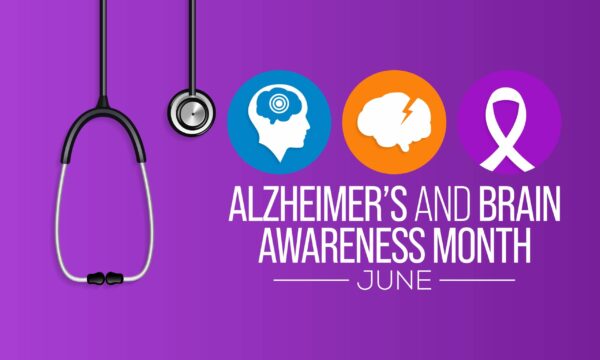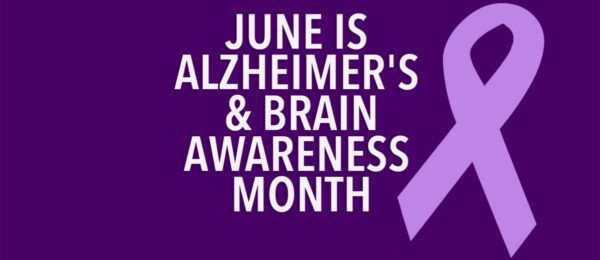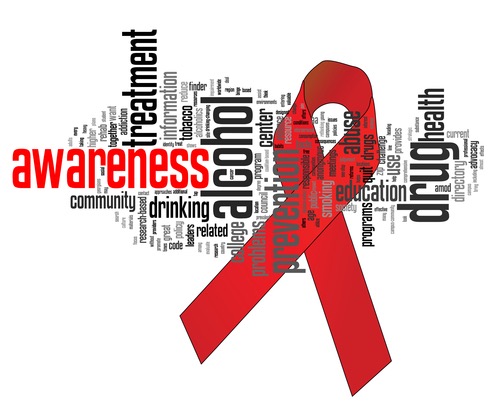
June, a month dedicated to unleashing the full potential of our brainpower and igniting awareness for Alzheimer’s disease. As we embark on this journey of enlightenment and advocacy, let’s explore how we can channel our collective energy to raise awareness, support research, and empower those affected by Alzheimer’s. Join us as we delve into actionable strategies to make a difference this Alzheimer’s Awareness Month.
Raising Awareness:
Awareness is the first step towards meaningful change. Spread the word about Alzheimer’s disease and its impact on individuals, families, and communities. Share informative resources, personal stories, and advocacy initiatives on social media platforms, in your local community, and among your networks. By raising awareness, we can shine a light on Alzheimer’s and inspire others to join the fight.
Supporting Research:
Research is the cornerstone of progress in the fight against Alzheimer’s. Get involved in fundraising events, volunteer opportunities, and advocacy campaigns to support organizations dedicated to Alzheimer’s research. Your contributions can fund groundbreaking studies, clinical trials, and innovative treatments that bring us closer to a world without Alzheimer’s.
Empowering Those Affected:
Alzheimer’s affects millions of individuals and their loved ones worldwide. Show your support by offering compassion, understanding, and practical assistance to those living with Alzheimer’s and their caregivers. Volunteer at local memory care facilities, participate in support groups, or simply lend a listening ear to someone in need. Your kindness and empathy can make a world of difference in the lives of those affected by Alzheimer’s.
Taking Action for Change:
Action speaks louder than words. Advocate for policy changes, increased funding for Alzheimer’s research, and improved access to care and support services. Write letters to lawmakers, participate in advocacy events, and engage with advocacy organizations to amplify your voice and drive meaningful change at local, national, and global levels.
As we ignite awareness for Alzheimer’s this June, let’s unleash the full power of our brainpower to make a difference. By raising awareness, supporting research, empowering those affected, and taking action for change, we can create a future where Alzheimer’s no longer robs individuals of their memories and dignity. Together, let’s stand united in the fight against Alzheimer’s and ignite a spark of hope for generations to come.
Thank you for taking this journey with us. Hopefully this has made you more aware of the necessity of good health. If you can make an impact throughout Alzheimer’s and Brain Awareness Month and Maximize Your Human Potential!

We are in the third week battling against Alzheimer’s and cognitive decline takes center stage. In this month dedicated to raising awareness, let’s explore how we can harness the power of mind over matter to combat these formidable adversaries. Join us as we dive into effective strategies to preserve cognitive function and champion brain health.
Navigating Alzheimer’s:
Alzheimer’s disease poses a significant challenge to individuals and communities worldwide. However, armed with knowledge and determination, we can navigate this journey with resilience. Explore treatment options such as cognitive enhancers and lifestyle interventions to manage symptoms and enhance quality of life. Additionally, participate in clinical trials to contribute to the advancement of Alzheimer’s research and potential breakthroughs.
Fueling Brain Resilience:
Just as a car needs fuel to run smoothly, our brains require nourishment to function optimally. Adopt a brain-healthy diet rich in nutrients like antioxidants, omega-3 fatty acids, and vitamins B and D. Incorporate foods such as fatty fish, leafy greens, nuts, and berries to support cognitive resilience and protect against age-related cognitive decline.
Empowering Early Detection:
Early detection is critical in the fight against Alzheimer’s and cognitive decline. Embrace the power of blood tests to identify biomarkers associated with brain health and cognitive function. Routine screenings for cholesterol, glucose, and inflammation levels can provide valuable insights and prompt proactive interventions to mitigate risk factors and promote brain resilience.
Insights from Genetic Profiling:
Genetic profiling offers personalized insights into individual susceptibility to Alzheimer’s disease and cognitive decline. By understanding genetic risk factors, individuals can implement targeted interventions to optimize brain health and reduce the likelihood of developing cognitive impairments. Explore lifestyle modifications, including regular exercise, stress management, and cognitive stimulation, to bolster brain resilience and support overall well-being.
Conclusion:
As we embark on June’s battle against Alzheimer’s and cognitive decline, let’s remember that mind over matter can be a powerful force for change. By navigating Alzheimer’s with resilience, fueling brain resilience with a nutrient-rich diet, empowering early detection through blood tests, and gaining insights from genetic profiling, we can tilt the odds in favor of cognitive vitality. Together, let’s embrace the challenge and pave the way for a future where cognitive health flourishes.
Stay tuned for our last actionable insights and tips throughout Alzheimer’s and Brain Awareness Month!

In the midst of June’s fervor for Alzheimer’s awareness, it’s time to recognize that memory matters. This month serves as a rallying cry to join the movement for brain health and take proactive steps to safeguard cognitive function. Let’s delve into practical strategies to champion brain health and honor the importance of memory in our lives.
Prioritizing Brain Health:
Maintaining brain health is crucial for preserving cognitive function and warding off conditions like Alzheimer’s disease. Engage in activities that stimulate the mind, such as puzzles, reading, and learning new skills. Physical exercise is also essential, as it enhances blood flow to the brain and promotes the growth of new brain cells. Make regular exercise a cornerstone of your routine to support long-term brain health.
Nutritional Support for the Brain:
Nutrition plays a pivotal role in brain health. Adopt a brain-boosting diet rich in fruits, vegetables, whole grains, and lean proteins. Incorporate foods high in antioxidants, such as berries, nuts, and leafy greens, to combat oxidative stress and protect brain cells from damage. Additionally, consider supplements like vitamin D and magnesium, which have been linked to improved cognitive function and mood regulation.
Harnessing the Power of Blood Tests:
Blood tests offer a window into our brain health, providing valuable insights for early detection and intervention. Routine blood screenings can assess cholesterol levels, blood sugar levels, and inflammatory markers, which impact brain health. Monitoring these biomarkers allows for timely intervention to mitigate risk factors and optimize brain function.
Insights from Genetic Testing:
Genetic testing empowers individuals to understand their unique risk factors for Alzheimer’s disease. By identifying genetic predispositions early on, individuals can implement personalized strategies to reduce risk and promote brain health. Embrace lifestyle modifications such as maintaining a healthy weight, managing stress, and prioritizing quality sleep to support overall well-being and cognitive vitality.
Conclusion:
As we navigate Alzheimer’s Awareness Month, let’s reaffirm that memory matters. By prioritizing brain health, embracing nutritional support, harnessing the power of blood tests, and gaining insights from genetic testing, we can champion cognitive vitality and honor the importance of memory in our lives. Together, let’s join the movement for brain health and pave the way for a brighter, more resilient future.
Stay tuned for more actionable insights and tips throughout Alzheimer’s and Brain Awareness Month!

Welcome to June, the month dedicated to unlocking minds and fighting against Alzheimer’s and brain fog. As we delve into this crucial awareness campaign, let’s explore effective strategies to combat Alzheimer’s, enhance brain health, and reclaim our cognitive vitality.
Tackling Alzheimer’s:
Alzheimer’s disease poses a significant challenge to individuals and families worldwide. However, advancements in treatments offer hope. From pharmaceutical interventions to lifestyle modifications, there’s a range of approaches to explore. Consult with healthcare professionals to explore options like acetylcholinesterase inhibitors or memantine, which can help manage symptoms and slow disease progression.
Harnessing the Power of Vitamins:
Vitamins play a crucial role in brain health. Incorporating nutrient-rich foods and supplements can provide essential support. Vitamin E, for instance, acts as an antioxidant, protecting brain cells from damage. Omega-3 fatty acids, found in fish oil supplements, promote brain function and may reduce the risk of cognitive decline. Ensure you’re getting an adequate intake of vitamins B6, B12, and folate, as deficiencies have been linked to cognitive impairment.
Blood Tests for Early Detection:
Early detection of Alzheimer’s is key to effective management. Blood tests are emerging as promising tools for diagnosing Alzheimer’s disease, offering a non-invasive and cost-effective alternative to traditional methods. Biomarkers such as amyloid beta and tau proteins can indicate the presence of Alzheimer’s pathology years before symptoms manifest. Speak with your healthcare provider about incorporating these tests into your wellness routine for proactive monitoring.
Unlocking Genetic Insights:
Genetic predisposition plays a role in Alzheimer’s risk. DNA tests, such as genetic screening for the APOE ε4 allele, can provide valuable insights into individual susceptibility. While genetic factors influence Alzheimer’s risk, they don’t determine destiny. Armed with this knowledge, individuals can adopt lifestyle measures to mitigate risk factors and promote brain health.
This June, let’s unite in the fight against Alzheimer’s and brain fog. By embracing treatments, optimizing vitamin intake, leveraging blood tests for early detection, and unlocking genetic insights, we can empower ourselves in the battle for cognitive vitality. Together, we can unlock minds and pave the way for a brighter, brain-healthy future.
Stay tuned for more insights and actionable tips throughout Alzheimer’s and Brain Awareness Month!

As May bids us farewell and the warmth of spring lingers in the air, I’m compelled to reflect on the significance of family, especially as we recently celebrated Mother’s Day—a time to honor the extraordinary women who have shaped our lives with love, wisdom, and unwavering support. In this closing blog for the month of May, let’s delve into the profound impact of family on our well-being, particularly in the realm of anxiety and life choices.
Mother’s Day: A Time for Reflection and Gratitude
Mother’s Day serves as a poignant reminder of the profound influence mothers, grandmothers, and mother figures wield in our lives. Whether through nurturing guidance, boundless love, or quiet strength, these remarkable individuals leave an indelible mark on our hearts and souls. As we honor them on this special day, let’s take a moment to express our deepest gratitude for the countless sacrifices they’ve made and the unwavering support they’ve provided.
The Power of Family: Nurturing Connection and Resilience
Beyond Mother’s Day, let’s explore the broader significance of family in shaping our well-being. Research consistently highlights the importance of strong familial bonds in fostering resilience, mitigating anxiety, and influencing life choices. From childhood through adulthood, the love, support, and sense of belonging that family provides serve as pillars of strength, guiding us through life’s inevitable challenges and triumphs.
Family and Anxiety: A Source of Comfort and Stability
In the realm of mental health, family plays a pivotal role in managing anxiety and promoting emotional well-being. The unconditional love and acceptance of family members create a safe haven where individuals feel heard, understood, and supported. Whether through comforting words, a reassuring embrace, or simply being present in times of need, family offers solace in the face of anxiety, instilling a sense of calm and reassurance.
Life Choices and Family Influence: Shaping Our Paths with Love
Moreover, family influences our life choices in profound ways, guiding us toward paths aligned with our values, aspirations, and passions. The guidance and wisdom imparted by parents and family members shape our beliefs, ambitions, and dreams, influencing the decisions we make and the paths we choose to pursue. Through their encouragement and belief in our potential, family members empower us to embrace our authentic selves and pursue fulfilling endeavors.
Closing Thoughts: Honoring the Heart of Family
As we bid adieu to May and reflect on the significance of Mother’s Day and the power of family, let’s carry the spirit of love, gratitude, and connection forward. Let’s cherish the bonds that unite us, honoring the heart of family and recognizing its profound impact on our well-being and life journey. May we continue to nurture these cherished connections, celebrating the love and support that enrich our lives each day.
Thank you, dear readers, for joining me on this reflective journey. May the lessons learned and the connections forged inspire us to embrace the heart of family with open arms and grateful hearts, today and always.

In the ever-evolving landscape of fitness, a significant shift has occurred as people increasingly recognize the profound impact of recovery and wellness on their overall well-being. This paradigm shift is not only transforming individual health practices but is also reshaping the very fabric of the fitness industry. From high-intensity workouts to recovery and rejuvenation, the holistic approach to fitness is gaining momentum, with gyms and fitness studios leading the charge.
Understanding the Importance of Recovery
Beyond the intensity of workouts, recovery has emerged as a crucial component of a well-rounded fitness routine. Recognizing the need for balance, individuals are prioritizing recovery to enhance performance, prevent injuries, and promote overall health. This awareness has sparked a revolution in the fitness industry, where recovery is not merely an afterthought but an integral part of the fitness journey.
Diversification of Fitness Services
Gone are the days when fitness centers solely focused on strenuous workouts. The current trend sees gyms and studios diversifying their offerings to include an array of recovery and wellness services. These services go beyond the conventional, embracing innovative approaches like cryotherapy, infrared saunas, and massage therapy to address both physical and mental recovery.
Cryotherapy: Chilling for Healing
Cryotherapy, the practice of exposing the body to extremely cold temperatures for short periods, has gained popularity for its potential benefits in reducing inflammation, relieving muscle soreness, and even boosting metabolism. Fitness enthusiasts are turning to cryotherapy chambers as a cutting-edge method to expedite recovery and optimize their performance.
Infrared Saunas: The Warmth of Well-Being
Infrared saunas, with their gentle heat penetrating the body, have become a favored choice for recovery. Beyond relaxation, these saunas are believed to promote detoxification, improve circulation, and alleviate muscle tension. The embrace of infrared saunas in fitness studios reflects a commitment to holistic well-being.
Massage Therapy: Healing Hands for Holistic Health
Massage therapy, a timeless practice, has found a new home in fitness centers. Beyond being a luxurious indulgence, massages are recognized for their therapeutic benefits, promoting muscle recovery, reducing stress, and enhancing flexibility. The integration of massage therapy into fitness services is a testament to the industry’s dedication to comprehensive wellness.
The Future of Fitness
As recovery and wellness services continue to weave themselves into the fabric of the fitness industry, we witness the emergence of a more comprehensive and holistic approach to health. The future of fitness lies not only in the intensity of workouts but in the thoughtful integration of recovery practices that nurture the body, mind, and spirit.
In this transformative era, where recovery is no longer a luxury but a necessity, fitness enthusiasts are not just sculpting their bodies—they’re cultivating a lifestyle of holistic well-being. The gyms and fitness studios of today are not just spaces for sweat and exertion; they are sanctuaries for recovery, rejuvenation, and the pursuit of optimal health. Embrace the revolution—where fitness is not a race but a journey towards holistic vitality.

As we peer into the not-so-distant future, the concept of fitness in the metaverse emerges as a fascinating, albeit perplexing, phenomenon. Are virtual and augmented reality (VR and AR) workouts truly the next frontier of fitness, or is this just another passing trend? The assertions about their growth in popularity in 2024 beg the question: can these immersive experiences genuinely redefine the way we approach exercise?
Immersive Fitness: A Game-Changer or a Gimmick?
The promise of a unique and immersive fitness experience is undoubtedly intriguing. The thought of donning VR headsets or engaging in AR-enhanced workouts brings a sense of novelty to the fitness realm. But, one might wonder, does the immersion translate to efficacy? Can these experiences genuinely rival the tangible benefits of traditional workouts, or are they more of a gimmick that appeals to our collective fascination with cutting-edge technology?
Accessibility for All: A True Game-Changer?
The assertion that VR and AR workouts can be accessible for people with disabilities or mobility issues raises essential questions about inclusivity in the fitness landscape. While the idea of breaking down physical barriers is commendable, one might ponder: do these technologies truly cater to the diverse needs of individuals with varying abilities? How seamless is the integration, and does it genuinely provide an inclusive fitness experience for everyone?
The Future: A Technological Triumph or Ethereal Experiment?
2024 is painted as the year when VR and AR workouts will thrive. Yet, we can’t help but question the long-term implications. Is this a lasting shift in the fitness paradigm, or are we witnessing an ethereal experiment that will fade away as swiftly as it appeared? Can virtual fitness truly replace the tangible connections forged in physical spaces like gyms and studios, or is it a supplement rather than a substitution?
In the metaverse, where the lines between reality and virtuality blur, the future of fitness appears to be both thrilling and enigmatic. As we navigate this uncharted territory, let’s question, explore, and critically assess whether the immersive promise of VR and AR workouts is a transformative leap into a new era of fitness or a fleeting mirage in the evolving landscape of wellness. Is this the dawn of a revolutionary fitness experience, or are we merely playing a captivating game within the metaverse? Only time will reveal the answers, and until then, let the questioning continue.



Welcome to the final chapter of our Stress Awareness Month journey, where we culminate our exploration with a focus on practical strategies to master the art of stress management. We’ve delved into the understanding of stress in the modern world, identified triggers, and built resilience. Now, armed with insights, let’s embark on a transformative quest towards a balanced and fulfilling life.
Crafting Your Stress Management Toolkit
- Holistic Well-being Practices: Stress management goes beyond fleeting remedies; it’s about cultivating a holistic approach to well-being. Explore practices like yoga, meditation, and deep breathing exercises to create a foundation for inner peace. These activities not only alleviate stress in the moment but contribute to long-term emotional resilience.
- Time Management and Prioritization: Effectively managing your time and priorities is a powerful stress management tool. Learn to distinguish between urgent and important tasks, delegate when necessary, and embrace the concept of “good enough.” By setting realistic expectations and boundaries, you create space for a more balanced and fulfilling life.
- Mindful Nutrition and Physical Activity: The connection between physical health and stress management is undeniable. Nourish your body with mindful nutrition, incorporating a balance of whole foods and hydration. Regular physical activity releases endorphins, reducing stress hormones and promoting a positive mood. Find joy in movement, whether it’s a brisk walk, a dance session, or a calming yoga practice.
- Digital Detox and Unplugging: In the digital age, a constant stream of information can contribute to stress. Practice periodic digital detoxes, set boundaries for screen time, and create tech-free zones in your home. Unplugging allows you to reconnect with the present moment, fostering a sense of calm and reducing the mental clutter that often accompanies technology.
- Cultivating Gratitude and Positivity: Shift your focus from what causes stress to what brings joy and gratitude. Keep a gratitude journal, acknowledging the positive aspects of your life. Surround yourself with positivity, whether through uplifting literature, inspiring podcasts, or meaningful conversations. Cultivating a positive mindset enhances resilience and transforms your approach to stress.
Creating a Balanced Life
- Setting Realistic Goals: Embrace the power of realistic goal-setting. Break down larger objectives into manageable steps, celebrating small victories along the way. This approach fosters a sense of accomplishment, reduces overwhelm, and allows you to maintain equilibrium in your pursuits.
- Embracing Self-Care Rituals: Prioritize self-care as a non-negotiable aspect of your routine. Whether it’s a quiet moment with a book, a soothing bath, or a creative outlet, dedicate time to activities that replenish your energy and nourish your soul. Recognize that self-care is not a luxury but a fundamental component of a balanced life.
- Continuous Learning and Adaptability: The ability to adapt and learn from experiences is fundamental to stress management. Cultivate a growth mindset, viewing challenges as opportunities for learning and personal development. This adaptability empowers you to navigate the ever-changing landscape of life with resilience and grace.
As we conclude our exploration of stress during this awareness month, remember that the journey towards a balanced life is ongoing. By integrating these practical strategies into your daily routine, you equip yourself with a personalized toolkit for mastering the art of stress management. Embrace the process, celebrate progress, and savor the moments of tranquility on your path to a more balanced and fulfilling life.
Thank you for joining me on this transformative journey. May the insights gained during Stress Awareness Month serve as a compass for navigating life’s challenges with resilience, mindfulness, and a commitment to well-being.

As April dawns upon us, it brings with it a poignant reminder: Stress Awareness Month. In a world where the hustle and bustle often blur the lines between urgency and serenity, it’s essential to pause and reflect on the silent yet significant struggle many of us face daily. Stress has become an unwelcome companion for countless individuals, affecting our mental, emotional, and physical well-being.
In this introductory piece, we embark on a journey to unravel the layers of stress, exploring its roots, manifestations, and impacts in our modern lives. Join me as we delve into the depths of this intricate phenomenon, shedding light on its prevalence and the imperative need to address it with empathy and understanding.
In the weeks to come, we’ll navigate through the labyrinth of stress, equipping ourselves with knowledge and strategies to combat its pervasive influence. Together, let’s embark on a transformative quest toward greater self-awareness and resilience in the face of adversity.
Stay tuned as we embark on this enlightening journey, seeking solace amidst the chaos and fostering a culture of compassion and support. It’s time to unveil the silent struggle and embrace the path to a more balanced and fulfilling life.
Are you ready to embark on this journey with me? Let’s navigate through the nuances of stress, arm ourselves with insights, and emerge stronger, wiser, and more resilient than ever before.
Unveiling the Silent Struggle
As April unfolds, casting its spotlight on Stress Awareness Month, it beckons us to pause and confront a prevalent yet often overlooked challenge: stress in the modern world. In the relentless pursuit of success, fulfillment, and societal expectations, stress has stealthily woven its threads into the fabric of our lives. It’s time to unravel the layers, understand its nuances, and, most importantly, empower ourselves with strategies to navigate this complex terrain.
Ways of Understanding Stress in the Modern World:
- Digital Overload and Constant Connectivity: The digital age has ushered in unprecedented connectivity, but it also brings a relentless barrage of information, notifications, and social comparisons. Our constant engagement with screens and the pressure to stay connected can contribute significantly to stress. Recognizing the impact of our digital interactions is the first step in understanding the modern dynamics of stress.
- Work-Life Integration Challenges: The traditional boundaries between work and personal life have blurred, ushering in the era of work-life integration. While this flexibility offers opportunities, it also poses challenges in establishing clear delineations. Understanding the demands of our multifaceted roles and acknowledging the need for balance is crucial for managing stress in a world that never truly disconnects.
- Social Pressures and Comparison Culture: The pervasive influence of social media has given rise to a culture of constant comparison. The carefully curated highlight reels of others can fuel feelings of inadequacy and intensify the pressure to measure up. Recognizing and challenging these societal expectations is essential for fostering a healthier mindset and mitigating stressors associated with comparison culture.
Positive Ways to Deal with Stress:
- Mindfulness and Meditation: Incorporating mindfulness practices and meditation into our daily routines can be a powerful antidote to stress. Taking time to focus on the present moment, breathe, and cultivate awareness helps break the cycle of anxious thoughts. Apps, guided sessions, or even simple moments of solitude can be transformative in building resilience.
- Establishing Boundaries: In a world where boundaries blur, setting clear limits is crucial. Learning to say no, prioritizing self-care, and carving out dedicated time for relaxation fosters a healthier balance. Establishing boundaries not only protects our well-being but also enhances our ability to navigate the challenges of the modern world.
- Cultivating a Supportive Network: Social connections are a cornerstone of well-being. Cultivating a supportive network of friends, family, or colleagues can provide invaluable emotional support. Sharing experiences, seeking advice, or simply having someone to lean on fosters a sense of community, reducing the isolating impact of stress.
Embarking on this journey to understand and navigate stress in the modern world requires both self-reflection and proactive steps toward positive change. In the coming weeks, we will delve deeper into these aspects, exploring practical strategies and insights to build resilience and embrace a more balanced and fulfilling life.
Are you ready to equip yourself with the tools needed to navigate the complexities of stress in the modern era? Stay tuned as we unravel the silent struggle together and discover pathways to a more empowered and serene existence.
